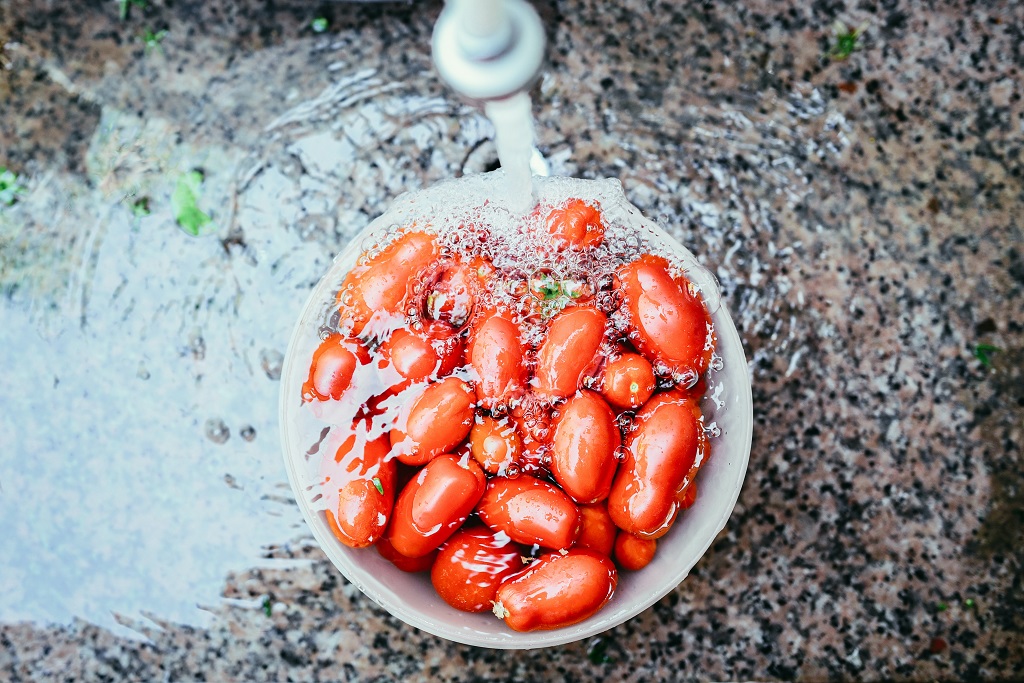Everyone understands the importance of clean water as we use it everyday. Yet, the access to clean water is not enough, especially in a kitchen setting. From my own experience, the soup or porridge cooked in tap water tastes very strange compared to filtered water.
Through my research on the city tap water, I’ve learned that chemicals like chlorine will be added for water treatment, which leads to the chemical leftovers in our daily tap water. That also explains the unsavory taste in the water before boiling.
The trace chemicals and minerals in tap water can affect the food that’s cooked with it. Take chlorine, for example, it can bleach the vegetables and create an unpleasant taste. Therefore, it has become an industry trade secret to use filtered water for cooking among chefs and other catering-related professionals.
Why Do I Need to Wash Fruits and Vegetables
It seems to be a natural habit to wash the fruits and vegetables before eating them, and YES, this is absolutely necessary. Why? The simplest answer to that is related to how the fruits and vegetables are grown as well as the products that are used to help the growth.
Fertilizers, cow manure and other substances designed to make the crops grow better can also have diseases in them. It is possible, although rare for these diseases to attach themselves to your fruits and vegetables. Besides that, there are also pesticide residue, dirt, and bacteria that would stay on the fruits and vegetables. If you don’t wash them, it is possible you will consume these bacteria and become sick.
Though industry standards like the agricultural code of conduct set limits on the usage of pesticides and substances related, foodborne illness seems inevitable along the supply chain. We often hear news about the Food and Drug Administration (FDA) do recall on lettuces as well as many other fruits and vegetables in order to prevent foodborne illness and outbreaks. Just in the first half of 2019, the FDA has issued 144 food recalls.
It is very important to wash the fruits and vegetables thoroughly before eating, but more importantly, you should better wash them with filtered water.
Washing and Cooking with Filtered Water
The major reason why you should wash and cook with filtered water is that the city water is not clean enough. Your home water can carry contaminants like lead or mercury. If you are on city municipal water, the water often contains compounds used to disinfect during city water treatment, for example, chlorine or chloramines.
When we try to rinse the things like pesticide residue off from the fruits and vegetables, those substances might still be in your food.
Pesticides and herbicides that are used in farms will travel through the piping systems from the drains at home when we wash the fruits and vegetables. The wastewater then goes to the treatment plants, where the pesticides and herbicides remain untreated in the detoxifying process.
The chlorines, as we’ve mentioned above, are another common contaminant in city water. While chlorine does a great job of disinfecting water, the chlorine leftovers bring a very unpleasant smell and taste. There are also many chlorine-resistant cysts like cryptosporidium and giardia, pharmaceuticals, VOCs, lead and more that could not be properly removed.
Therefore, while you’re trying to get rid of the herbicides and pesticides, you might still be washing them with water that carries these chemicals.
How Can I Have Filtered Water at Home
So what do we do with unclean water? Assuming we have access to a source of heat, we boil it, as that’s what every health organization recommends when there is risk in any water supply.
While boiling water does help eliminate bacteria and other living organisms that can damage a body, it does not remove lead and other contaminants that can still cause harm if consumed at unsafe levels.
Installing a water filtration system at home would be a certain solution to protect you and your family from exposure to dangers. Below are some popular home water filtration systems for your reference:
- Reverse osmosis systems
- Ultrafiltration systems
- Faucet filtration systems
- Water filter pitchers
- Gravity-fed water filtration systems
The systems vary from filtration accuracy to filtration capacity, and you would need to run a test for your home water and decide which system you would like to install. Once you have a home water filtration installed, you can enjoy rinsing your pasta, cleaning your fruits and veggies, and cooking with safe water all the time.



